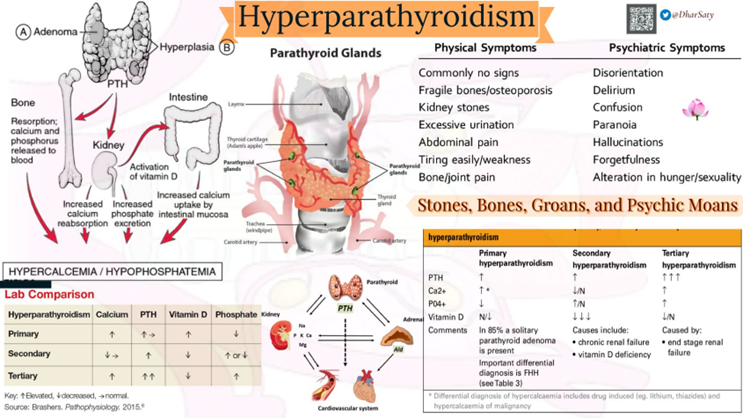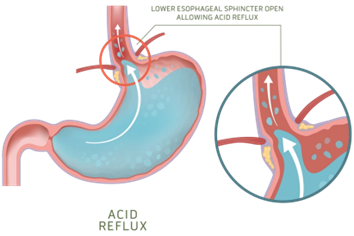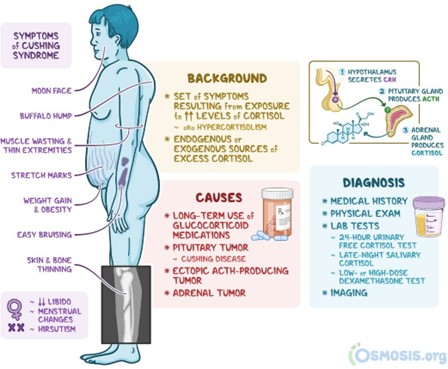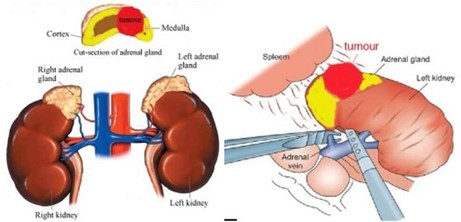A patient with primary hyperparathyroidism has a serum calcium level of 14 mg/dl (3.5 mmol/L), phosphorus of 1.7 mg/dl (55 mmol/L), serum creatinine of 2.2 mg/dl (194 mmol/L). and high urine calcium. While the patient awaits surgery, the nurse should:
institute seizure precautions such as padded side rails.
assist the patient to perform range-of-motion exercises QID.
encourage the patient to drink 4000 ml of fluid daily.
monitor the patient for positive Chvostek’s or Trousseaus sign.
The Correct Answer is C
The patient with primary hyperparathyroidism has high levels of calcium in the blood (hypercalcemia) which can lead to symptoms such as kidney stones, bone pain, and weakness. High urine calcium levels may also be present due to the increased calcium in the blood.
One important intervention for managing hypercalcemia is to encourage fluid intake to promote increased urine output and prevent the formation of kidney stones. Therefore, the nurse should encourage the patient to drink at least 4000 ml of fluids per day.
Seizure precautions (a), range-of-motion exercises (b), and monitoring for positive Chvostek’s or Trousseaus sign (d) are not directly related to managing hypercalcemia and are not necessary in this case.

Nursing Test Bank
Naxlex Comprehensive Predictor Exams
Related Questions
Correct Answer is A
Explanation
GERD can increase the risk of aspiration (inhalation of stomach contents into the lungs), which can cause respiratory issues, including abnormal breath sounds. In these cases, monitoring of breath sounds may be more appropriate than monitoring of bowel sounds.
Bowel sounds are not typically monitored for GERD patients as GERD is a condition that affects the esophagus and the stomach, not the intestines. GERD is caused by the reflux of stomach contents into the esophagus, which can cause symptoms such as heartburn and regurgitation.
Abdominal girth is not routinely monitored for GERD patients as it is not typically related to the condition. GERD is a disorder that affects the esophagus and stomach and does not typically cause significant changes in abdominal size or girth. In rare cases, GERD can be complicated by a condition known as a para oesophageal hernia, which can cause a visible bulge in the abdomen. In these cases, monitoring of abdominal size and shape may be necessary.
The apical pulse is not routinely monitored for GERD patients as it is not directly related to the condition. GERD is a disorder that affects the digestive system, specifically the esophagus and stomach and does not typically have an impact on heart rate or rhythm.

Correct Answer is B
Explanation
This response acknowledges the patient's concerns and provides reassurance that the changes are temporary and will improve after surgery. Response is dismissive of the patient's concerns and may make the patient feel unheard. Response c may be helpful, but it does not address the patient's emotional concerns. Response d is not accurate because the patient has expressed feeling awful about their appearance.


Whether you are a student looking to ace your exams or a practicing nurse seeking to enhance your expertise , our nursing education contents will empower you with the confidence and competence to make a difference in the lives of patients and become a respected leader in the healthcare field.
Visit Naxlex, invest in your future and unlock endless possibilities with our unparalleled nursing education contents today
Report Wrong Answer on the Current Question
Do you disagree with the answer? If yes, what is your expected answer? Explain.
Kindly be descriptive with the issue you are facing.
